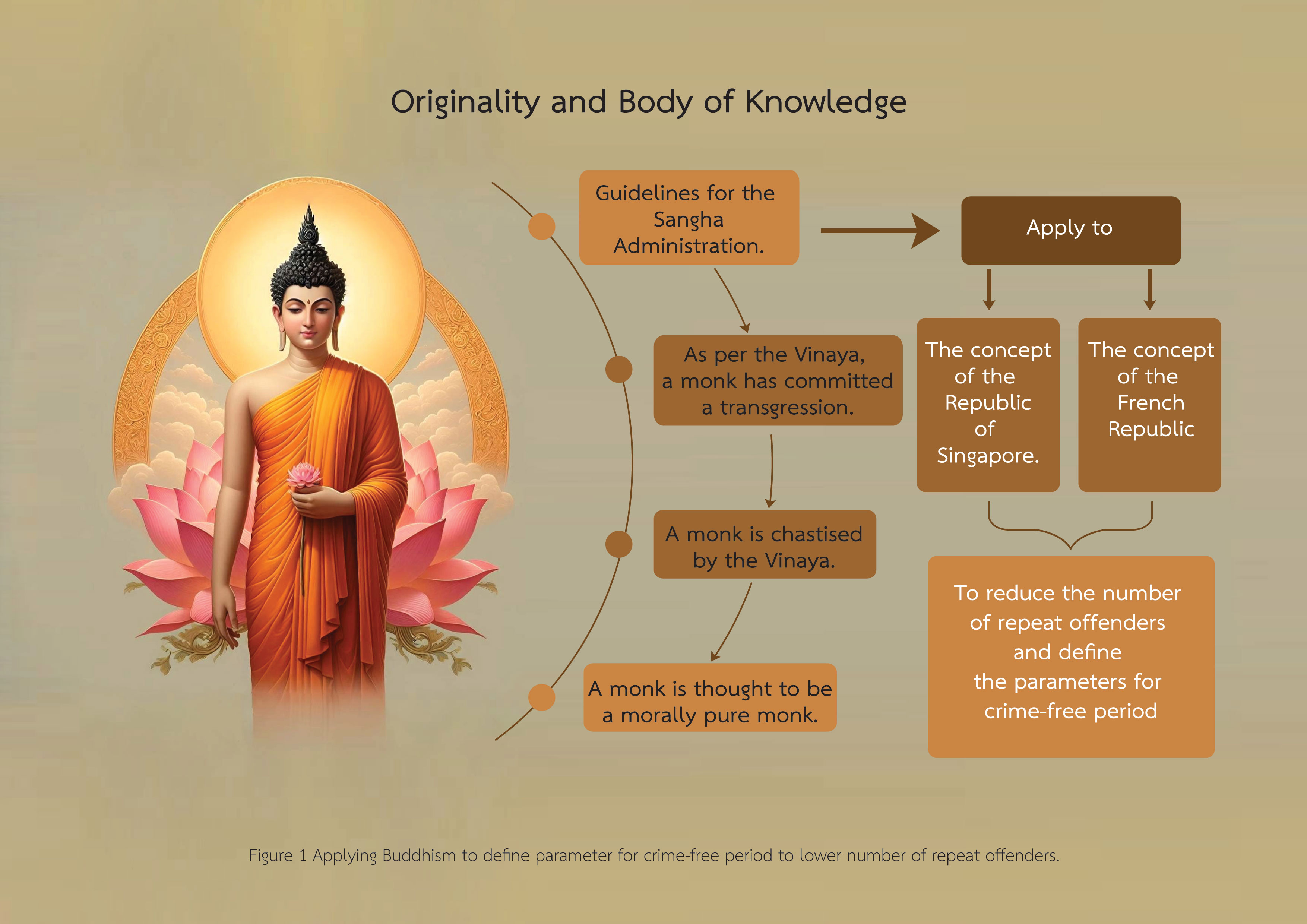DEVELOPMENT OF JUDICIAL PROCESS TO DEFINE PARAMETER FOR CRIME-FREE PERIOD TO LOWER NUMBER OF REPEAT OFFENDERS: A CASE STUDY OF INTERNATIONAL LAW AND DISCIPLINES
Keywords:
Crime-Free Period, Repeat Offenders, Vinaya ActAbstract
Background and Objective: Prison inmates are overflowing with the fact that society does not provide opportunities for former prisoners. These are factors that cause Thailand to spiral into endless problems. This group of people must make more effort than others to ask for a small opportunity to regain space to continue living because they have made a mistake and committed a crime. Moreover, it becomes a seal that prevents them from accessing "opportunities." Prisoners know that returning to the outside world is not easy. When they do not have a job and are not accepted by society, they fall back into the old cycle. The reason why released prisoners re-offend is because they are unable to find a job. Therefore, they must commit crimes without any choice to survive in society. When released from prison, a person has a criminal record. Stigmatized by society, no one dares to hire someone to work, and when society does not provide opportunities, they have to earn money through illegal means and become a repeat offender. The purpose of this research article is to compare the determination of crime-free periods in Thailand and abroad, including the guidelines of the Vinaya Act regarding a monk who has committed an offense according to the Vinaya. The Buddha prescribes punishments for monks only in cases specified in the Vinaya to find solutions and make recommendations to the government regarding the importance of bringing peace to society.
Methodology: This qualitative research analyzed information from both national and international legal documents, and information from the study of the Vinaya Act. The researcher used documentary research method, including research from the Vinaya Act, Tripitaka, and legal texts related to the development of the judicial process to define parameter for crime-free period to lower number of repeat offenders.
Main Results: They revealed that 1) A parameter for a crime-free period should have been defined after a person was released from punishment if he or she did not commit a repeat offense. 2) When a person was cleansed for a specified period, it affected judgment; that was, the person who was cleansed caused the erased sentence. As a consequence, the offender whose guilt was cleared would have become someone who had never been convicted before.
Involvement to Buddhadhamma: Development of judicial process defined parameters for crime-free period. It was related to the nature of applied Buddhism. It was the application of guidelines from the Vinaya Act regarding a monk who had committed an offense according to the Vinaya and applying Buddhist teachings to the law for defining a crime-free period to lower the number of repeat offenders for sustainable society.
Conclusions: Thailand had a severe problem of releasing people from prison and re-offending. Even though releasing people from prison was ready to improve themselves, if society did not give them the opportunity and stigmatized them, as they say, humans would naturally have a bias towards releasing people from prison. Knowing the history, no one would have dared to take the job. Therefore, it was one factor that forced many people who were released from prison to repeat crimes according to the "badge" given to them by society. Even though society should have given these people a chance to escape punishment, the equation would have been completed. Although imprisonment was an essential mechanism of the criminal justice process, the impact of imprisonment also became the stigma of the inmates. The best thing society could have offered was an "opportunity" to be part of society again without "stigma." Work opportunities were essential to help formerly incarcerated people start a new life after being released.
References
Pali IX. (2024). Recording The Criminal History of Monks. (Wisetsin, C., Interviewer).
Phra Brahmagunabhorn (P.A. Payutto). (2014). Buddhist Dictionary Glossary Edition (22th ed.). Phra Nakhon Si Ayutthaya, Thailand: Mahachulalongkornrajavidyalaya University.
Phrakru Kosolsasanabandit Krishna Buchakun. (2021). The Capital Punishment (Death Penalty) in the View of Buddhist Ethical Philosophy and Western Philosophy. Journal of Buddhamagga, 6(1), 1-12.
Phramaha Udom Saramedhi. (2003). A Comparative Study of the Process of Justice in Buddhism: A Case Study of the Suppression (Niggahakamma) in the Vinaya Pitaka and the Principles Enforced by Mahathera Council. [Unpublished master's dissertation]. Mahachulalongkornrajavidyalaya University. Phra Nakhon Si Ayutthaya, Thailand.
Raksakaeo, P. (2021). Creating Equality in Society: Concepts Based on Good Governance. Journal of MCU Social Science, 10(1), 333-343.
Rattanachai, P. (2022). The Violation of the Buddhist Law that Affect the Sangha Act B.E. 2505: Case Study of Criminal Penalty. Ramkhamhaeng Law Journal, 11(1), 163-179.
Srisanit, P. (2018). Criminal Record Reform and the Idea of Determining Punishments Appropriate to the Offender (Individualization). In Arnon, M. (Eds.), Nitithamprajak Surasak 60 Years (1st ed.). (pp. 149-181). Bangkok, Thailand: Dueantula Press.
Sutham, Y. (2018). A Model of Participation between Community Justice Centres and Chachoengsao Central Prison That Aiming to Return the Good Citizens Back to Their Communities. [Unpublished doctoral dissertation]. Rajabhat Rajanagarindra University. Chachoengsao, Thailand.
Teeraphan, P. (2019). An Approach to Development of Law Concerning Criminal Record of Child and Juvenile. Naresuan University Law Journal, 12(2), 87-111.
Tongmuaengluang, B. (2018). Criminal Records Management in Criminal Justice System. [Unpublished doctoral dissertation]. Thammasat University. Bangkok, Thailand.
Woottipunyaitsakul, P. (2003). Buddhism and Political Development. Nakhon Ratchasima, Thailand: Mahachulalongkornrajavidyalaya University Nakhonratchasima Campus.

Downloads
Published
How to Cite
Issue
Section
License
Copyright (c) 2024 Journal of Buddhist Anthropology

This work is licensed under a Creative Commons Attribution-NonCommercial-NoDerivatives 4.0 International License.








